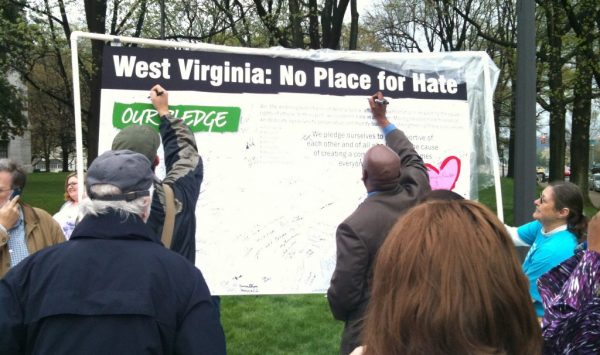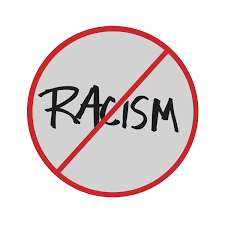
When I was a very little girl, small enough to fit in a child-size chair in our small coat-closet under the staircase, I remember looking at pictures of black African people in a National Geographic magazine and pondering how lucky I was to have been born a white person in America and wondering how that happened. Why in the world did I have such a thought as a little child? My socialization? Over-hearing conversations between adults in the household?
Grownups hadn’t talked to me about white privilege back then, and racism wasn’t discussed in my home, though occasionally I saw or heard news about civil rights protests across the country. I remember hearing about sit-ins at Huntington’s restaurant, (in)appropriately called, “White Pantry” and wondering why some people, because of the color of their skin, weren’t allowed to eat in certain downtown restaurants. That puzzled me, though it probably shouldn’t have. After all, I grew up in a lily-white, working-class neighborhood. Back then, I hadn’t put two and two together. Yet, as a child, I knew that the unfair treatment of African Americans by white people was wrong.
As a little white girl, I somehow knew that life in a white working-class family was way easier and different from the lives of people with dark skin. I knew by virtue of my white skin, I had white privilege before I ever heard or understood what the phase meant.
Undoubtedly, growing up in an all-white neighborhood playing only with other white-skinned kids, attending an all-white elementary school and an all-white church, I was exposed to both overt and covert racism (and I didn’t know what either meant at the time). I was shaped by white culture.
As a young adult, my eyes began to open to the cruelty and injustices suffered by people of color. Not only had my country began with the slaughtering, displacing and marginalizing of God-only-knows how many Native Americans, but also its founders ripped people from their homelands and then enslaved them. Those actions created some God-awful karma. We, as a nation, and white-skinned people in particular, (even though we weren’t born when all this was taking place), owe a huge debt.
Only after I began working for OVEC in the early 90s did I begin to develop a better understanding of my own unacknowledged racism and white privilege and white supremacy. I had to face, that within reason, most all doors were generally open to me (access), and that I could pursue my dreams unfettered (power), with access to sufficient resources unlike people of color. I didn’t do anything to earn access or power in my life. Access and power were conferred on me by people in power in institutions in our country (government, education, religion, etc.) by virtue of my white skin. Racism is a systemic issue, not just a personal issue.
Unlike people of color, I don’t have to think about my day-to-day actions. For example: I’m not followed in stores when I shop. My voting rights aren’t questioned. Nor do I live with the constant threat of harassment or violence against me because of the color of my skin. I’m not targeted by police for driving while white. I can walk through most any neighborhood wearing a hoody and not be shot for wielding a candy bar or cell phone.
Here is something that I am not saying. I am not saying that every white person has equal access, power and resources to pursue his/her life dreams. In fact, a sense of powerlessness is what often leads to scapegoating, blaming and racism. But my point is this: regardless of your socioeconomic status, your gender, your sexual orientation or religion, all other things being equal, if your skin is white, then the institutions in this country confer advantage to you (just like they do for me).
In preparation for writing this piece, I watched a YouTube: Tim Wise, “The Pathology of White Privilege.” Everyone, especially white people, should take time to watch this. Tim Wise is a white man who has a deep understanding of his own white privilege. Undoubtedly, the same talk could be given by a black man speaking from his own life experiences to this all white audience, but isn’t it appropriate that we, as white folks should be educating ourselves and others about white privilege and racism?
I had heard about racism being a construct meant to keep people divided, but didn’t quite understand much about that until I watched this video. Wise spells it out pretty clearly and bluntly. Through perpetuating the concept of race, the elites (those at the pinnacle of the socio-economic scale), maintain their political and economic status. However, our differences are not about race, but are actually about class and economic status. And undoubtedly, those at the top of the heap, those who believe in white supremacy, will do anything necessary to stay on top.
My thoughts return to a book I read many years ago—Games People Play, by Eric Berne. One of the most common “games” is “Let’s You and Him Fight.” Those who have much to gain by keeping people divided love and encourage this game because it works. The political elites spout things like, “they’re rapists,” “immigration is destroying your jobs,” “they are voting illegally,” or “they’re welfare cheats,” when in fact statements like that are meant to create distrust and divisions. At the same time, those with political and economic power are busy passing policies to benefit their bank accounts and investments, destroying our social safety-net, or dismantling democracy whilst we fight among ourselves.
Let’s face it, there are way more of us ordinary folk than there are white, billionaire politicians and industrialists. If the majority of the people of our nation were not distracted by the notion of “us versus them,” if ordinary folks ever wake up to our greater commonalities, odds are we would be a unstoppable force for good for the sake of all people. All people will benefit when we support and lift up those who have been the most marginalized by our rigged system. To build a truly democratic nation, we, as whites, need to go beyond just examining our individual white privilege and racism. We must act. We must educate ourselves about the truth of how our nation became prosperous through the blood, sweat, tears, and lives of our fellow humans and stop believing the white-washed version of history that textbook writers and others have peddled as truth. We need to talk with our family and friends about how white skin instantly confers privilege and with that privilege comes the responsibility to be a part of the solution to dismantle racism. Not only can we work on our own “stuff, ” but also we can work within clubs and groups to help change unjust institutions.
Social and environmental justice organizations, as well as individuals, should make space for cross-race collaborations and support. Don’t wait for an incident to begin. Take immediate action when needed, such as confronting the self-serving “Westboro Baptist Church.” It was gratifying to be a part of organizations that joined forces to counter the hate when they demonstrated in Charleston a few years back.
Other ways to decrease racism and increase solidarity is to support victims of unjust treatment by police or others. Don’t be silent. We need to stay politically engaged to pressure elected leaders into passing legislation that prevents racial discrimination and profiling. And we should celebrate and acknowledge the many contributions to as well as sacrifices people of color have made for our nation.
And one last thought. We, as Appalachians, have a rich cultural heritage—our music, art, dance and food; in West Virginia, the Vandalia Gathering is all about celebrating these gifts that we contribute to our nation’s rich cultural diversity. Some things from our region are so unique, like ramps and Molly moochers (morels), that even New York restaurants serve them. We are pleased when they recognize, appreciate and acknowledge these things came from our region and don’t appropriate it as their own! So keep in mind that appreciation and acknowledgement of different cultures is right and good, but appropriation and taking someone else’s cultural heritage as your own…not so good.
——-
Coming up November 30 – December 1: Call to Action for Racial Equality’s Mountain State Racial Justice Summit










Janet has written an excellent essay worthy of group discussion.
I suspect some white people avoid talk about white privilege because they do not feel they are bigoted, and don’t want to be charged with guilt. But that is not the issue. Rather, as Janet points out, white people have inherent advantages. And those who have advantages and power have a God-given responsibility to facilitate the empowerment of those who have relative disadvantage. As Janet says, we must act. That is, action personally and through institutions, to repent of the sin and blight of racial injustice, and to build toward a beloved community of rich diversity and harmony.